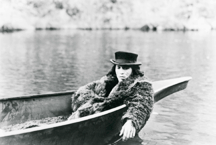The Sonnet of Will's Guns
Nothing Canoe Under the Sun: Johnny Depp drifts aimlessly through Jim Jarmusch's new film, 'Dead Man.'
Director Jim Jarmusch's Blakean vision of the Old West is sillier than paradise
By Richard von Busack
THE NEW Jim Jarmusch film, Dead Man, is the kind of movie you wish you could blame on drugs. It is the result of what happens when a dry-humored urban artist becomes a mystic. In his sixth full-length film, Jarmusch (Stranger Than Paradise, Night on Earth) heads out into the wilderness to "touch Indians," as that deathless line from Albert Brooks' Lost in America has it. An average bad moviemaker just trips over his feet; a visionary plummets off a precipice. Dead Man is no mundane wreck but a beautifully photographed, expensively art-directed, grievously simpleminded wreck with a lost cast, tossed-off dialogue and a monotonous Neil Young score.
In 1870, a misled Ohio accountant named William Blake (Johnny Depp) has been lured to the frontier hellhole of Machine, where he's promptly shot and shoots back. Blake spends the rest of the movie dying slowly of the bullet wound he received and eluding bounty hunters hired by the father of the man he shot, the boss of Machine (played by Robert Mitchum, who looks both lordly and puzzled, as if he didn't know what the hell was going on). Blake is nursed into a sort of walking delirium by a Native American named Nobody (Gary Farmer of Powwow Highway), who believes that Blake is actually the William Blake, and that the visionary poet has come back from the dead to chastise the white man, this time not with an engraving tool but with a revolver. Hounded and nearly killed several times over, Blake eventually does become a gunslinger, saying, "I wonder if you know my poetry," before plugging some bad guys.
Well, to contradict the real-life William Blake, Dead Man is one road of excess that doesn't lead to the palace of wisdom. The film is a disappointment because the opening scenes have some promise: Blake's journey into the wilderness is depicted without dialogue; we just see the train gradually filling up with rougher and rougher men. The town of Machine is Once Upon a Time in the West via Eraserhead; the woods the characters slog through are silvered prettily by Robby Müller's camera; art director Robert Ziembicki has created an elaborate Native American village. Saying that the film has a look gives it all the due it deserves.
In his earlier pictures, Jarmusch's biggest asset was a cold, cerebral sense of humor. Now, he seems to be endorsing a point of view encapsulated by Nobody's pastiche of the wisdom-of-Tonto quotations (including "Don't let the sun burn a hole in your ass"). As much as Jarmusch ever accents a scene, he seems to underscore the big line by the character called Train Fireman (Crispin Glover): "I wouldn't trust no words on no piece of paper." Jarmusch, following that advice, throws away his cerebral qualities for a Blakean transcendentalism, but as a filmmaker, intellectuality was all he had. For all its good looks, difficulty and casual violence, Dead Man may be heralded as Jarmusch's masterpiece, but it's a dead movie. This isn't cross-cultural poetry; it's a grotesque mixed metaphor.
[ Metro | Metroactive Central | Archives ]

Christine Parry
Dead Man (R; 127 min.), directed and written by Jim Jarmusch, photographed by Robby Müller and starring Johnny Depp and Robert Mitchum.
